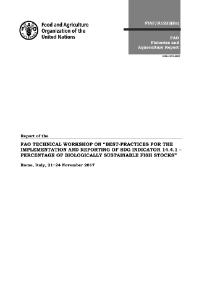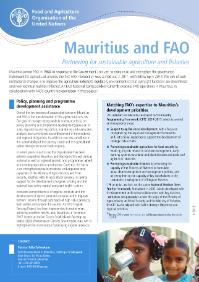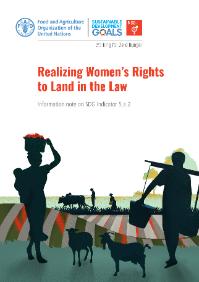Focal point
Location
The Food and Agriculture Organization of the United Nations leads international efforts to defeat hunger. Serving both developed and developing countries, FAO acts as a neutral forum where all nations meet as equals to negotiate agreements and debate policy. FAO is also a source of knowledge and information. We help developing countries and countries in transition modernize and improve agriculture, forestry and fisheries practices and ensure good nutrition for all. Since our founding in 1945, we have focused special attention on developing rural areas, home to 70 percent of the world's poor and hungry people.
Members:
Resources
Displaying 536 - 540 of 5074Report of the Technical Workshop on “Best-practices for the implementation and reporting of SDG Indicator 14.4.1 – Percentage of biologically sustainable fish stocks, Rome, Italy, 21–24 November 2017
The FAO Technical Workshop on “Best-practices for the implementation and reporting of SDG indicator 14.4.1 – Percentage of biologically sustainable fish stocks” was held in Rome, Italy, from 21 to 24 November 2017. The purpose of the Workshop was to raise awareness of SDG 14.4.1’s significance and global reporting process, provide technical training to national practitioners on the analytical methods to produce Indicator 14.4.1, and look for examples of datasets and indicators from which best practices can be compiled.
Mauritius and FAO
Mauritius joined FAO in 1968. In response to the Government’s request to reorganize and strengthen the governance
framework for agricultural services, the first FAO intervention was carried out in 2011, with follow up in 2014. The aim of suchinstitutional changes is to improve the agriculture industry’s regulatory environment so that oversight functions are streamlinedand new technical realities reflected. An FAO National Correspondent currently oversees FAO operations in Mauritius, incollaboration with FAO’s country representation in Madagascar.Realizing women’s rights to land in the law
Goal 5 of the Sustainable Development Goals (SDGs) “Achieve
gender equality and empower all women and girls” recognizesthe fundamental role of women in achieving povertyreduction, food security and nutrition.Target 5.a aims to “Undertake reforms to give women equalrights to economic resources, as well as access to ownershipand control over land and other forms of property, financialservices, inheritance and natural resources, in accordance withnational laws”.As the designated custodian for Target 5a, FAO has developedForests and Sustainable Cities
Recognizing the importance of the services provided by forests and trees to urban dwellers, the Collaborative Partnership on Forests proposed that the theme for the 2018 International Day of Forests would be “Forests and Sustainable Cities”. To mark this occasion and promote the widespread adoption of “green” strategies for dealing with urban challenges, FAO invited the mayors of 15 different sized cities from various regions around the world to present their experiences with trees and forests and to show how this green infrastructure has helped address urban challenges.
Aumentar el uso de las Directrices Voluntarias sobre la Gobernanza Responsable de la Tenencia entre las Organizaciones de la Sociedad Civil y de Base - Guatemala
Las Directrices voluntarias sobre la gobernanza responsable de la tenencia de la tierra, la pesca y los bosques en el contexto de la seguridad alimentaria nacional (DVGT) establecen principios y normas internacionalmente aceptados sobre prácticas responsables, proporcionando un marco de referencia para los gobiernos, el sector privado y la sociedad civil a la hora de elaborar políticas y programas para mejorar la seguridad alimentaria.











